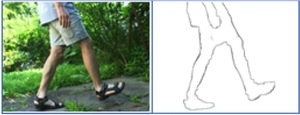Occlusion boundary detection via deep exploration of context
2016
Conference Paper
ps
Occlusion boundaries contain rich perceptual information about the underlying scene structure. They also provide important cues in many visual perception tasks such as scene understanding, object recognition, and segmentation. In this paper, we improve occlusion boundary detection via enhanced exploration of contextual information (e.g., local structural boundary patterns, observations from surrounding regions, and temporal context), and in doing so develop a novel approach based on convolutional neural networks (CNNs) and conditional random fields (CRFs). Experimental results demonstrate that our detector significantly outperforms the state-of-the-art (e.g., improving the F-measure from 0.62 to 0.71 on the commonly used CMU benchmark). Last but not least, we empirically assess the roles of several important components of the proposed detector, so as to validate the rationale behind this approach.
| Author(s): | Huang Fu and Chaohui Wang and Dacheng Tao and Michael J. Black |
| Book Title: | IEEE Conf. on Computer Vision and Pattern Recognition (CVPR) |
| Pages: | 241-250 |
| Year: | 2016 |
| Month: | June |
| Department(s): | Perceiving Systems |
| Bibtex Type: | Conference Paper (inproceedings) |
| Paper Type: | Conference |
| Event Name: | IEEE International Conference on Computer Vision and Pattern Recognition (CVPR) 2016 |
| Links: |
pdf
|
|
BibTex @inproceedings{Fu:CVPR:2016,
title = {Occlusion boundary detection via deep exploration of context},
author = {Fu, Huang and Wang, Chaohui and Tao, Dacheng and Black, Michael J.},
booktitle = { IEEE Conf. on Computer Vision and Pattern Recognition (CVPR)},
pages = {241-250},
month = jun,
year = {2016},
doi = {},
month_numeric = {6}
}
|
|



